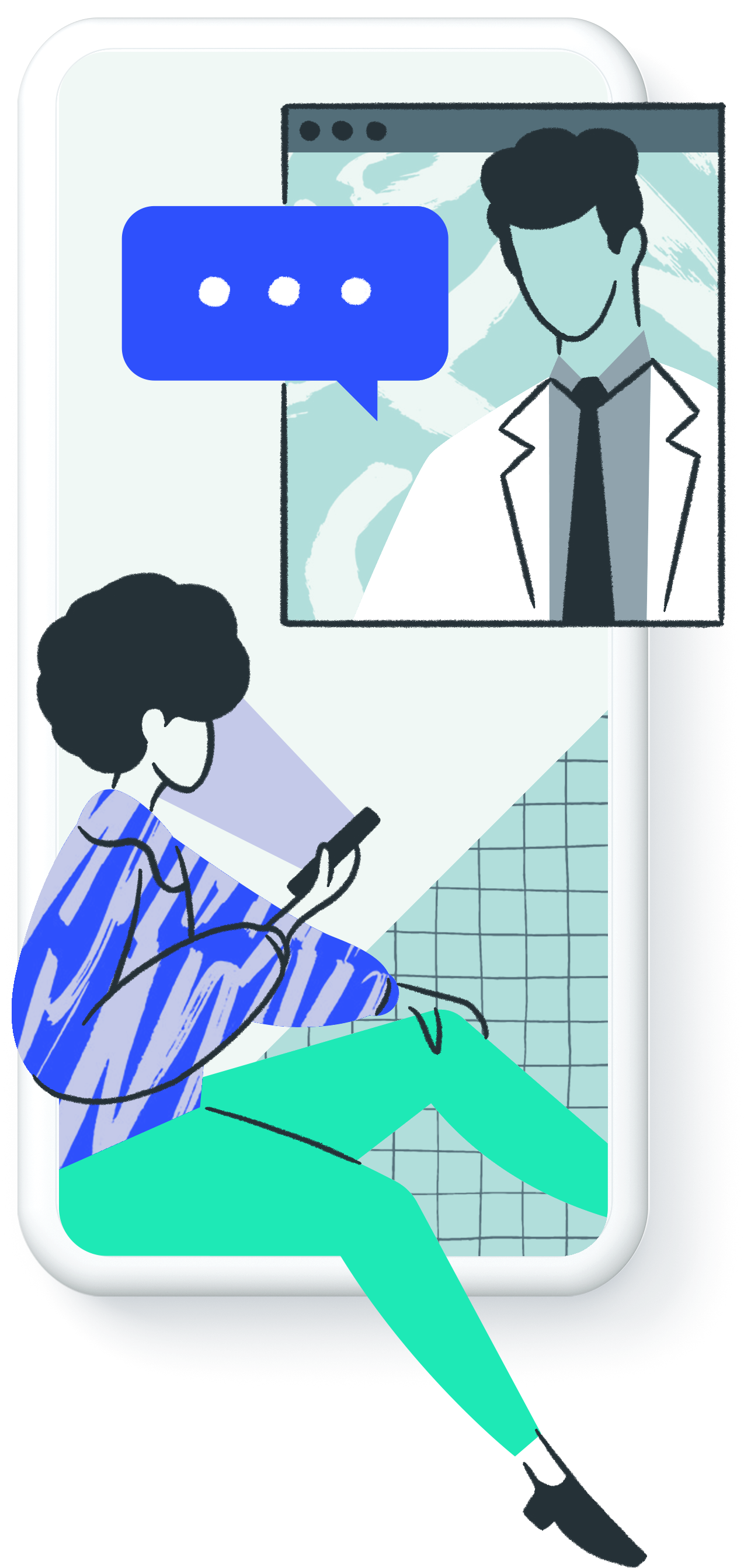- Home
- What we treat
- Cold, flu and RTIs
Cold, Flu & RTIs: An Overview
Everything you need to know about cold, flu and respiratory tract infections (RTIs), including causes, telltale signs and treatment.
What is the difference between colds and flu?
Both common colds and flu are caused by viruses, and both are respiratory infections. As a result, it can be difficult to tell the two apart – at least at a first glance. Though some symptoms are present in both conditions, for instance a blocked or runny nose, sore throat and headaches, flu symptoms are generally more severe. The following symptoms can be present in flu, but generally aren't present in a cold:
- Running a fever (temperature of 38ºC or higher)
- Severe muscle aches
- Severe fatigue
- Nausea and vomiting
- Diarrhoea and/or stomach pains
The other difference between the two is longevity. While colds might only last for a few days, up to a week or so in the majority of cases, flu symptoms can be present for up to two weeks.
How do symptoms differ between colds, flu and RTIs?
Cold symptoms include the following:
- Blocked or runny nose
- Sore throat
- Headaches
- Muscle aches
- Coughing
- Sneezing
- Elevated temperature
- Feelings of pressure in the ears and face
- Loss of taste and/or smell
Flu symptoms, however, include the following:
- Running a fever (temperature of 38ºC or higher)
- Sore throat
- Headaches
- Severe muscle aches
- Dry coughing
- Severe fatigue
- Difficulty sleeping
- Loss of appetite
- Nausea and vomiting
- Diarrhoea and/or stomach pains
Respiratory tract infection (RTI) symptoms, on the other hand, include:
- Running a fever (temperature of 38ºC or higher)
- Blocked or runny nose
- Sore throat
- Headaches
- Muscle aches
- Throaty cough bringing up mucus/phlegm
- Breathlessness or a tight chest
When should I see a doctor with a cold, flu or RTI?
We generally only recommend seeing a doctor for cold, flu and RTI symptoms in the following cases:
- You are under the age of 5
- You are over the age of 64
- You are pregnant
- You have a pre-existing long-term health condition
- You have a weakened or compromised immune system
- Your symptoms have not improved after 7 days
That said, although the majority of colds, flu and RTIs clear within a few days, if the above don't apply to you and you are at all concerned about your symptoms, don't hesitate to book an appointment with one of our GPs.
What forms of RTI are there?
Some of the most common types of respiratory tract infection found in the UK today.
There are no results for your search. Check your spelling or use fewer words or characters.
Flu
Almost as common as it is contagious, flu is a virus that many of us will have experienced at some point in our lives.
Chest infections
An infection causing inflammation of the lungs and lower air passages.
Sinusitis
Inflammation in the sinus lining, often confused with cold or flu since it generally follows those conditions.
Tonsillitis
Where tonsils become swollen and infected. Common in children, but also experienced by adults.
Viral infections
Cold and flu are two of the most common viral infections worldwide, affecting people of all ages.
Respiratory Tract Infections (RTIs)
Affect airways and the lungs, causing breathlessness, coughing and a tight chest.
Cold
Experienced by people once a year on average. Usually not serious, but still frustrating, with no cure as of writing.
Sore throat
Where the throat feels scratchy or sore, making it difficult to speak or swallow. Results from viruses or bacteria.
Cough
A reflex that clears the throat, airways and lungs to prevent serious infections. Can be painful, if not persistent.
Bronchitis
Infection of the lower airways, causing mucus production, coughing and occasionally, wheezy breathing.
Glandular fever
AKA 'mono', a common condition affecting the neck glands. Experienced by teenagers and adults in their 20s.
Nasal congestion
Better known as a blocked nose, and occurring with a medical issues like colds, flu and hay fever.
Can I treat my cold, flu or RTI with antibiotics?
No. As colds and flu and the majority of RTIs are caused by viral infections, antibiotics will have no effect. In these cases, antibiotics will not relieve your symptoms or speed up your recovery from any of the above conditions.
Even if antibiotics were effective, we would be hesitant to prescribe them – though doing so is entirely at an individual doctor's discretion. We have complete faith in the doctors on our platform to make the right decision for each patient.
With all of this in mind, it is important to note that there is a small percentage of RTIs that are caused by bacterial infections, for which your doctor may prescribe antibiotics if they deem it appropriate to do so.
It is thanks to the continued rise of antibiotic resistance that we are increasingly hesitant to prescribe antibiotics. As Dr Tom Micklewright, one of our medical officers, wrote in February 2019: "Antibiotic resistance...occurs when bacteria change and become non-responsive to first-line antibiotic solutions". That means that with continued use of antibiotics to treat ailments that can, in the majority of cases, be safely managed at home, we could see the development of advanced cold, flu and RTI strains that don't respond to any available medication – so it is no wonder we avoid using antibiotics unless they are absolutely necessary, as any other medical organisation should.
Your cold, flu and RTI questions, answered

How can I avoid catching colds, flu and RTIs?
Viruses that cause colds, flu and RTIs are generally spread days before symptoms start to appear in an infected individual. There are steps you can take to stand you in good stead in avoiding catching any of the above, however:
- Keeping your hands clean with warm water and soap
- Avoiding sharing towels, cups, cutlery and so on with people already displaying symptoms
- Avoiding touching your eyes or nose if you think you have come into contact with the virus
- Staying fit and healthy
- Stopping smoking
- Tempering your alcohol consumption
- In the case of flu, having the flu vaccination
How can I avoid spreading colds, flu and RTIs?
It is no secret how easily colds, flu and RTIs can be spread, but there are measures you can implement to reduce the risk:
- Keeping your hands clean with warm water and soap
- Using tissues to catch germs when you cough, sneeze or blow your nose
- Disposing of used tissues as soon as possible
Can exercise help with colds, flu and RTIs?
There is evidence to suggest that regular physical activity can improve your chances of avoiding the development of cold and flu entirely. Our in-house exercise physiologist Ben Fletcher has written a comprehensive blog on exactly this subject, but the major takeaway points are as follows:
- Studies have shown that exercise helps to strengthen the immune system, equipping the body to more effectively fight off infections like colds, flu and RTIs
- It is safe to exercise when you have a cold, the flu or an RTI – but be sensible, don't try to break any records or personal bests
- Be wary of exercising when taking medicine that increases your heart rate as a side effect or risk experiencing shortness of breath, or trouble breathing altogether
- It is less safe to exercise when you are feverish, as exercising in these circumstances puts more stress on the body than is really necessary

 CQC regulated
CQC regulated
Push Doctor is regulated by the Care Quality Commission (CQC), the independent regulator of health and social care in England.
They are the foremost authority in our industry, assessing health providers' ability to provide people with safe, effective, compassionate and high-quality care – be they offline or online doctors.
Push Doctor is registered with the CQC under the name 'Square Health', with the registration number 1-3060117803.
Our most recent inspection took place in May 2019, concluding that the service we provide is safe, effective, caring, responsive and well-led – gaining a 'Good' rating overall. You can read the report in full on our CQC profile.
 Secure data
Secure data
Push Doctor uses the latest technologies to ensure utmost security. We utilise several layers of firewall security and encrypt all personal data to ensure it’s safe.
All users are required to go through a two-step verification process to create and restore an account. Online access to an account is protected with a password that a user creates and PD apps support touch ID technology.
When using the platform, all personal data is transmitted through the internet using secure socket Layers (SSL) technology. SSL technology causes a browser to encrypt entered information before transmitting it to our secure server. SSL technology, an industry standard, is designed to prevent a third party from capturing and viewing Personal Data.
 Authorised medicines seller
Authorised medicines seller
Push Doctor is registered with the Medicines & Healthcare products Regulatory Agency (MHRA), and fully approved to sell medicines from our website.
We have been approved sellers since our inception, with the company number of C46132. As authorised MHRA sellers, we are approved to sell the following as and when we need to do so:
- Prescription only medicines
- General sales list medicines
- Pharmacy medicines
We regularly review the medications that we prescribe on our service, making sure to meet best practice and only ever provide outstanding care. With this, and our CQC rating, you know you are in safe hands.
 GMC-registered GPs
GMC-registered GPs
All of our doctors are NHS-trained and registered with the General Medical Council (GMC), ensuring that you are only ever receiving the best possible care and advice.
We encourage you to familiarise yourself with our online doctors, check their GMC profiles for yourself – every doctor on our platform has one, which you can easily search the GMC's database for.
In the majority of cases, we even give a direct link to our doctors' LinkedIn pages so you can see where they have worked in the past and where they were educated.
You can also see who our medical support and data protection teams are as well.
We welcome scrutiny, and encourage you to get in touch if you have any questions, concerns or comments about the people that power Push Doctor.
